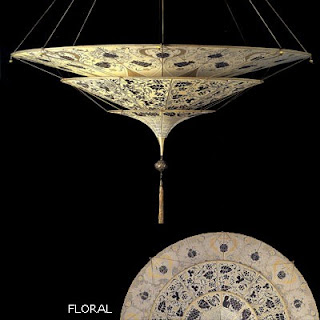 |
| The Samaekanda with it's broad collar, stenciled in an almost Nouveau style of floral imagery. |
I fell for Fortuny's light the first time I saw his chandelier in a showroom. It was huge, like a bronze flying saucer, a paisley pattered pierced metal ring orbiting a fluted glass shade suspended by silk cords and Murano glass beads. The light diffused through the hand painted amber glass as shadows were cast on the ceiling. It was at once heavenly, exotic, and surreal. Truly like no other item in the showroom, and considering they were made in the very early 20th century, unlike any item found in Fortuny's time as well.
Fortuny's fantastic lighting was a byproduct of his experiences with theatrical lighting design and his dabbling in the fashion trade. In his theatrical work, he learned the ways of manipulating the new electric light, and pushed the boundaries of convention in doing so. In fashion, he applied exotic patterns on delicate silks. In both he created fantasy and excitement, not just through ingenuity and machinery, but also through triggering a reaction in the mind and psyche; creating an illusion that his audience wanted to be a part of.
 |
| The Scudo Saraceno. Silk stenciled in a Turkish pattern. |
 |
| The Grand Salon of Fortuny's Palazzo. Note how the fixtures unique simplicty seems at home in the interior, even though they are radically modern for the period. |
Photo's of his 13th Century Palazzo show Bohemian Renaissance interiors, scattered with exotic objet and oriental carpets. Paintings hung over Fortuny's own fabric climb the walls to a beamed ceiling. Light streams in through leaded glass windows. A counter point is struck by his alien chandeliers.
 |
| I love the wonderfully, slightly decrepit, floor lamp made from a silk shaded pendant. So magical and charming. The scattered pillows give a Turkish flavor. |
 |
| Fortuny's Library with industrial pendants draped in silk gauze. |
Dropping from carved and polychrome ceilings, his umbrella like creations of stenciled silk stretched over sinuous wire frames are excruciatingly modern and far ahead of their own time. The streamlined pieces are accentuated with ribbon like tassels, Murano glass beads, braided silk cords; the stenciling shows roots in Islamic and other Eastern designs. In function, they could not be more ingenious. The silk diffuses the light, letting it softly stream down below, simultaneously, the trumpet or bowl shape of the shade blasts the light up, illuminating the ceiling surface. Considering he practiced during the Belle Epoche / Art Nouveau / Victorian Era where fashion and taste dictated cut crystal on multi-armed chandeliers, these understated pendants are a thumbed nose at the establishment.
Fortuny's lighting is just as fresh today, yet we have the benefit of knowing Fortuny's story and character, and that only enhances the allure of these decadent pieces. Hang one in your foyer or dining room for moody and unexpected drama, or suspend a smaller style in a powder or bathroom for an irreverent touch of the exotic. There are even wall sconces that will give the most incredible impact in the smallest of spaces.
- Ian
 |
| The Scheherazade is multi tiered with floral stenciling. |
 |
| The Concubina, with painted silk panels in wood frames. |
 |
| Vintage Fortuny fixtures. They remind me of something seen on a Gypsy wagon. Such fantasy and imagination. |

No comments:
Post a Comment